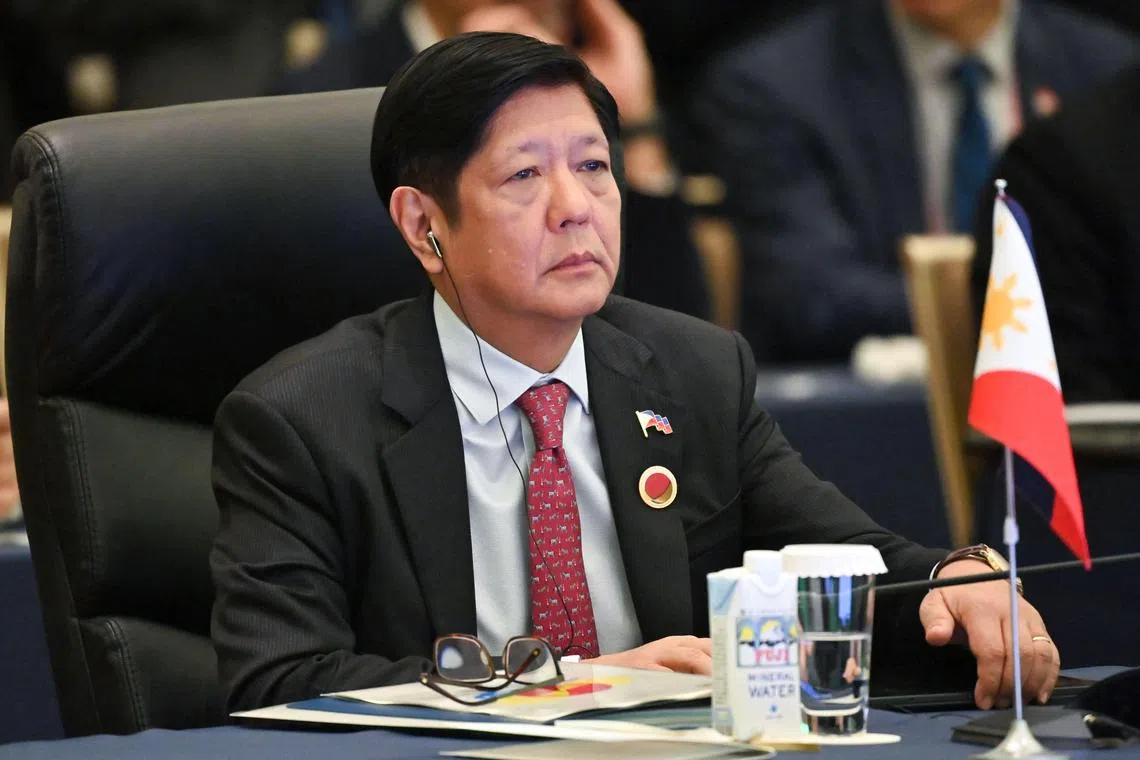Philippines wants to start new energy exploration projects in South China Sea
Sign up now: Get insights on Asia's fast-moving developments

Mr Ferdinand Marcos Jr underscored the need to forge strong alliances with like-minded allies, akin to the trilateral cooperation among the Philippines, Japan, and the US.
PHOTO: AFP
Follow topic:
MANILA - Philippine President Ferdinand Marcos Jr said his country is working to resolve “exploration issues” in the South China Sea so it could start new energy exploration projects in the resource-rich waterway to meet his nation’s energy needs.
Mr Marcos, in an interview with Japanese media on Dec 16, said tensions in the South China Sea have “increased rather than diminished” in recent months, warning that a “more assertive China” posed a “real challenge” to its Asian neighbours.
The Philippines and China have resumed discussions about jointly exploring oil and gas resources in the South China Sea, where the two nations have sparred for decades over sovereign rights to develop natural resources in the strategic waterway.
But “very little progress” has been made with regard to the talks, Mr Marcos said, according to a press release from his office as he attends a Tokyo summit of Japan and Asean.
“We are still at a deadlock right now,” Mr Marcos said as he emphasised his country’s right to exploit energy reserves in the West Philippine Sea at a time the Philippines wants to reduce its reliance on fossil fuel and coal and transition to liquefied natural gas.
Manila refers to the portion of the South China Sea that is within its exclusive economic zone as the West Philippine Sea.
Efforts to find a legally viable way to cooperate on energy exploration have stalled repeatedly, with previous administration abandoning talks in June 2022, citing constitutional constraints and issues of sovereignty.
On Dec 10, Manila and Beijing traded accusations over a collision of their vessels near a disputed shoal in the South China Sea as tensions over claims in the vital waterway escalate.
Besides the Philippines, Asean members Vietnam, Indonesia, Malaysia and Brunei claim parts of the South China Sea disputed by China. China claims almost all of the sea, a conduit for more than US$3 trillion (S$4 trillion) of annual ship-borne commerce.
The Permanent Court of Arbitration in 2016 said China’s claims had no legal basis, a ruling that Washington supports but Beijing rejects.
“I’m afraid we’ll have to be able to say that tensions have increased rather than diminished for the past months or the past years,” Mr Marcos said as he underlined the need to resolve issues peacefully.
The challenge that China posed required “new solutions”, said Mr Marcos, who has vowed to defend his country’s rights in the South China Sea after the collision, which Manila has described as a “serious escalation”. REUTERS

